Critically Evaluating Mentoring for UK Hospitality Development
VerifiedAdded on 2019/12/03
|7
|2299
|170
Essay
AI Summary
This essay critically evaluates the effectiveness of mentoring as a method to address management development challenges in the UK hospitality industry, using Hilton Hotels as a case study. It explores the industry's growth, the increasing need for quality services, and the importance of human resources. The essay examines the role of leadership, training programs, and mentoring in enhancing employee performance and consumer satisfaction. It discusses different types of mentoring programs, challenges faced by organizations, and the impact of coaching on employee development. The CORE model of coaching is also analyzed, along with the potential drawbacks of mentoring. The essay concludes that, while requiring investment, mentoring is a valuable tool for improving employee development and organizational growth within the competitive hospitality sector. References from various journals and online resources are included to support the analysis.
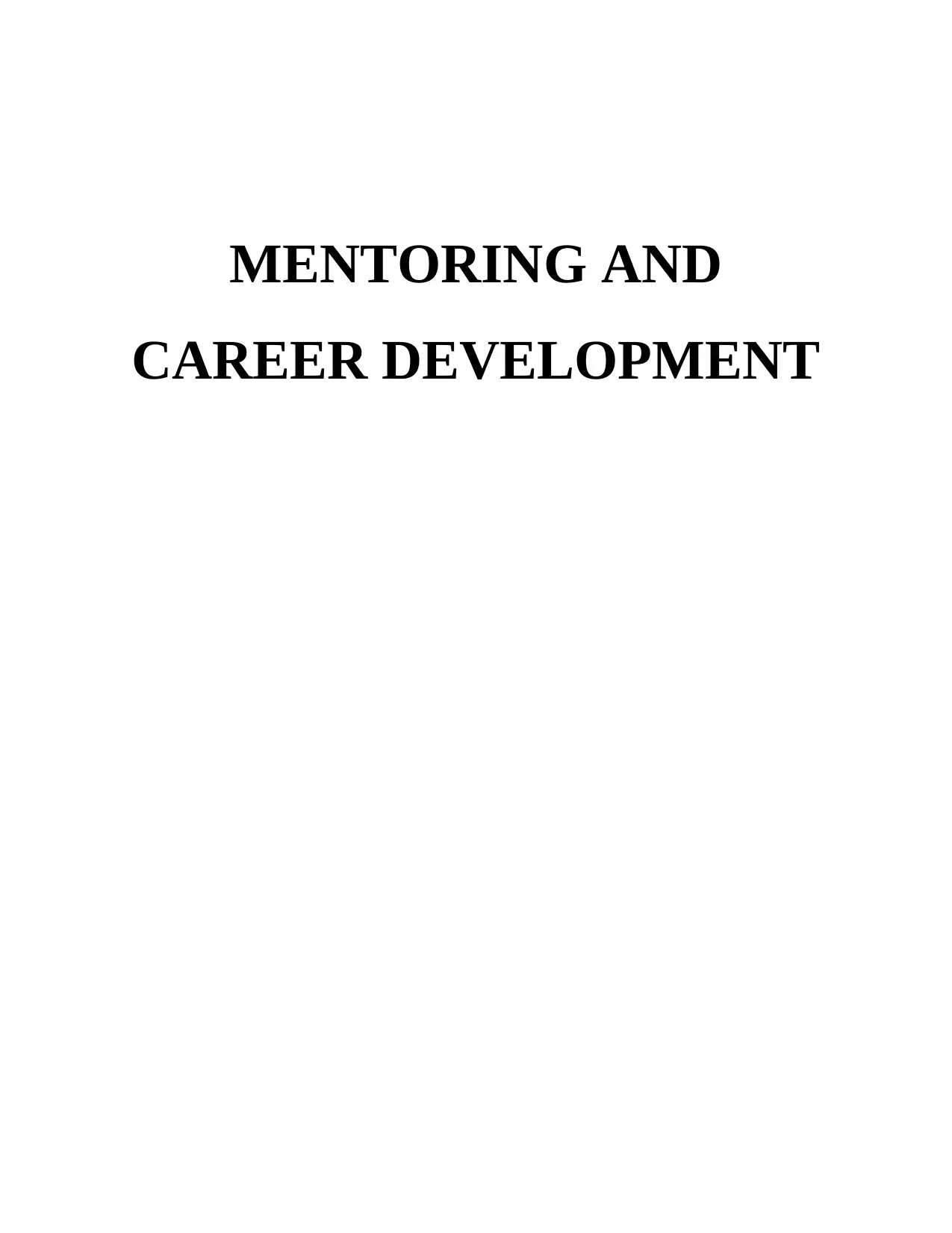
MENTORING AND
CAREER DEVELOPMENT
CAREER DEVELOPMENT
Paraphrase This Document
Need a fresh take? Get an instant paraphrase of this document with our AI Paraphraser
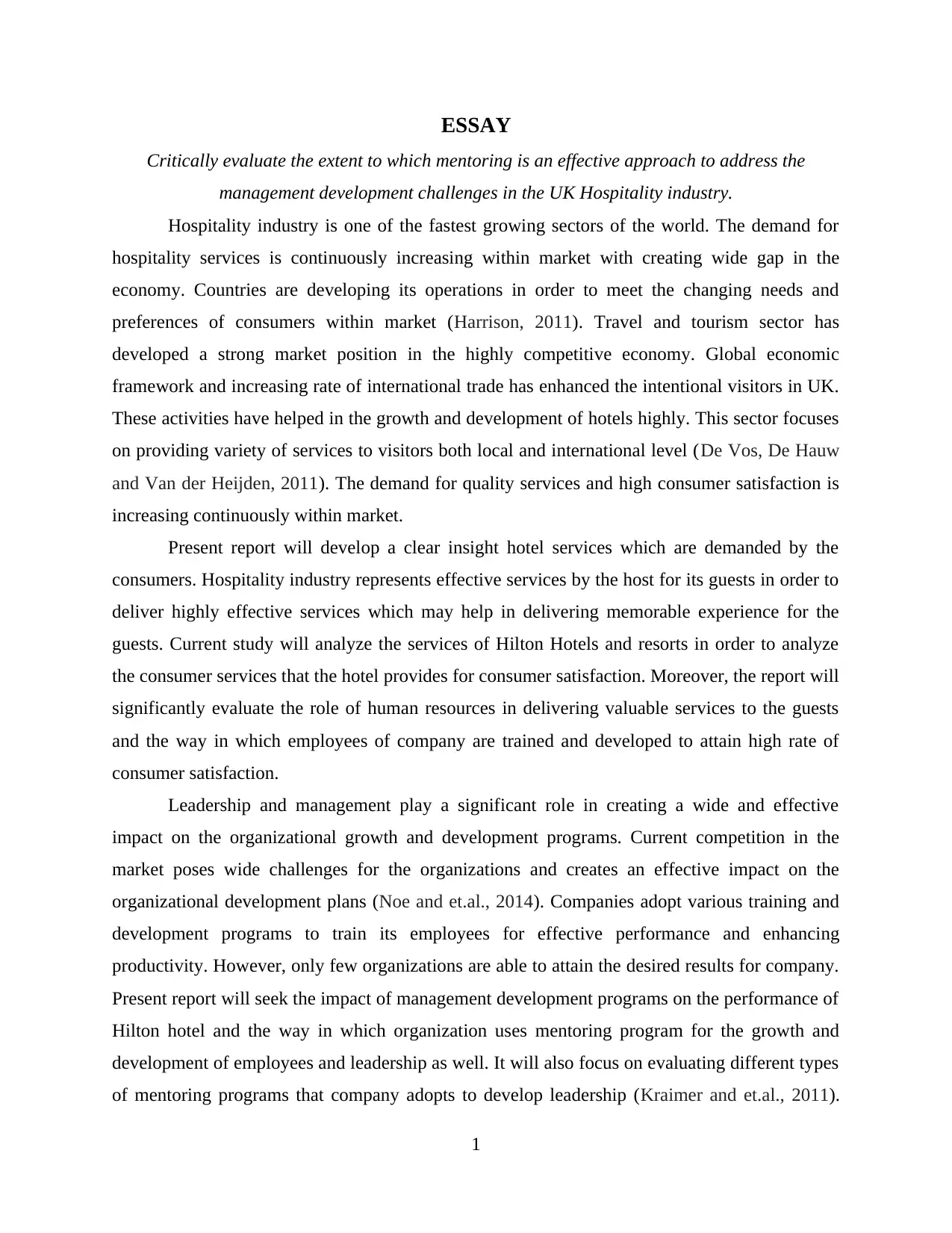
ESSAY
Critically evaluate the extent to which mentoring is an effective approach to address the
management development challenges in the UK Hospitality industry.
Hospitality industry is one of the fastest growing sectors of the world. The demand for
hospitality services is continuously increasing within market with creating wide gap in the
economy. Countries are developing its operations in order to meet the changing needs and
preferences of consumers within market (Harrison, 2011). Travel and tourism sector has
developed a strong market position in the highly competitive economy. Global economic
framework and increasing rate of international trade has enhanced the intentional visitors in UK.
These activities have helped in the growth and development of hotels highly. This sector focuses
on providing variety of services to visitors both local and international level (De Vos, De Hauw
and Van der Heijden, 2011). The demand for quality services and high consumer satisfaction is
increasing continuously within market.
Present report will develop a clear insight hotel services which are demanded by the
consumers. Hospitality industry represents effective services by the host for its guests in order to
deliver highly effective services which may help in delivering memorable experience for the
guests. Current study will analyze the services of Hilton Hotels and resorts in order to analyze
the consumer services that the hotel provides for consumer satisfaction. Moreover, the report will
significantly evaluate the role of human resources in delivering valuable services to the guests
and the way in which employees of company are trained and developed to attain high rate of
consumer satisfaction.
Leadership and management play a significant role in creating a wide and effective
impact on the organizational growth and development programs. Current competition in the
market poses wide challenges for the organizations and creates an effective impact on the
organizational development plans (Noe and et.al., 2014). Companies adopt various training and
development programs to train its employees for effective performance and enhancing
productivity. However, only few organizations are able to attain the desired results for company.
Present report will seek the impact of management development programs on the performance of
Hilton hotel and the way in which organization uses mentoring program for the growth and
development of employees and leadership as well. It will also focus on evaluating different types
of mentoring programs that company adopts to develop leadership (Kraimer and et.al., 2011).
1
Critically evaluate the extent to which mentoring is an effective approach to address the
management development challenges in the UK Hospitality industry.
Hospitality industry is one of the fastest growing sectors of the world. The demand for
hospitality services is continuously increasing within market with creating wide gap in the
economy. Countries are developing its operations in order to meet the changing needs and
preferences of consumers within market (Harrison, 2011). Travel and tourism sector has
developed a strong market position in the highly competitive economy. Global economic
framework and increasing rate of international trade has enhanced the intentional visitors in UK.
These activities have helped in the growth and development of hotels highly. This sector focuses
on providing variety of services to visitors both local and international level (De Vos, De Hauw
and Van der Heijden, 2011). The demand for quality services and high consumer satisfaction is
increasing continuously within market.
Present report will develop a clear insight hotel services which are demanded by the
consumers. Hospitality industry represents effective services by the host for its guests in order to
deliver highly effective services which may help in delivering memorable experience for the
guests. Current study will analyze the services of Hilton Hotels and resorts in order to analyze
the consumer services that the hotel provides for consumer satisfaction. Moreover, the report will
significantly evaluate the role of human resources in delivering valuable services to the guests
and the way in which employees of company are trained and developed to attain high rate of
consumer satisfaction.
Leadership and management play a significant role in creating a wide and effective
impact on the organizational growth and development programs. Current competition in the
market poses wide challenges for the organizations and creates an effective impact on the
organizational development plans (Noe and et.al., 2014). Companies adopt various training and
development programs to train its employees for effective performance and enhancing
productivity. However, only few organizations are able to attain the desired results for company.
Present report will seek the impact of management development programs on the performance of
Hilton hotel and the way in which organization uses mentoring program for the growth and
development of employees and leadership as well. It will also focus on evaluating different types
of mentoring programs that company adopts to develop leadership (Kraimer and et.al., 2011).
1
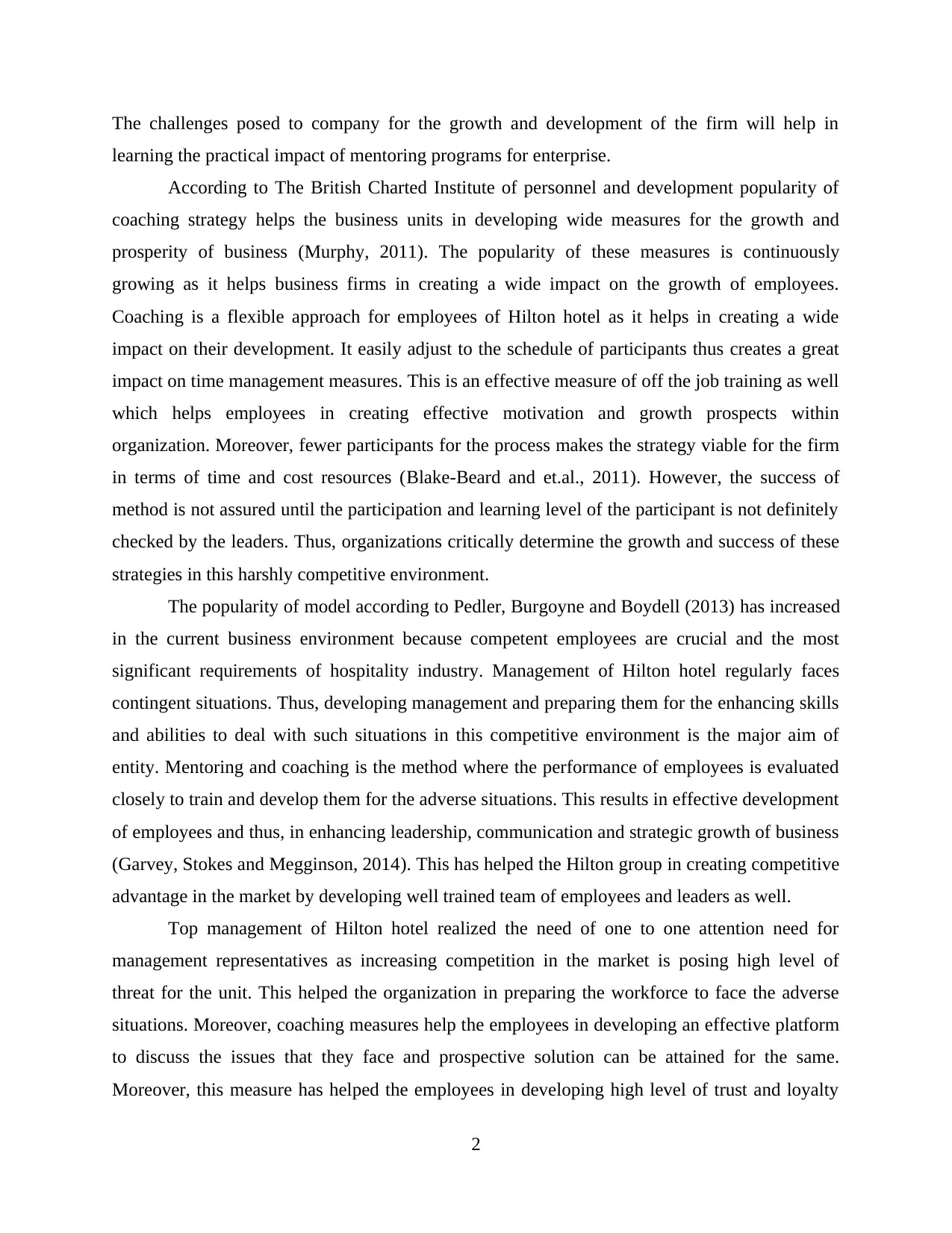
The challenges posed to company for the growth and development of the firm will help in
learning the practical impact of mentoring programs for enterprise.
According to The British Charted Institute of personnel and development popularity of
coaching strategy helps the business units in developing wide measures for the growth and
prosperity of business (Murphy, 2011). The popularity of these measures is continuously
growing as it helps business firms in creating a wide impact on the growth of employees.
Coaching is a flexible approach for employees of Hilton hotel as it helps in creating a wide
impact on their development. It easily adjust to the schedule of participants thus creates a great
impact on time management measures. This is an effective measure of off the job training as well
which helps employees in creating effective motivation and growth prospects within
organization. Moreover, fewer participants for the process makes the strategy viable for the firm
in terms of time and cost resources (Blake‐Beard and et.al., 2011). However, the success of
method is not assured until the participation and learning level of the participant is not definitely
checked by the leaders. Thus, organizations critically determine the growth and success of these
strategies in this harshly competitive environment.
The popularity of model according to Pedler, Burgoyne and Boydell (2013) has increased
in the current business environment because competent employees are crucial and the most
significant requirements of hospitality industry. Management of Hilton hotel regularly faces
contingent situations. Thus, developing management and preparing them for the enhancing skills
and abilities to deal with such situations in this competitive environment is the major aim of
entity. Mentoring and coaching is the method where the performance of employees is evaluated
closely to train and develop them for the adverse situations. This results in effective development
of employees and thus, in enhancing leadership, communication and strategic growth of business
(Garvey, Stokes and Megginson, 2014). This has helped the Hilton group in creating competitive
advantage in the market by developing well trained team of employees and leaders as well.
Top management of Hilton hotel realized the need of one to one attention need for
management representatives as increasing competition in the market is posing high level of
threat for the unit. This helped the organization in preparing the workforce to face the adverse
situations. Moreover, coaching measures help the employees in developing an effective platform
to discuss the issues that they face and prospective solution can be attained for the same.
Moreover, this measure has helped the employees in developing high level of trust and loyalty
2
learning the practical impact of mentoring programs for enterprise.
According to The British Charted Institute of personnel and development popularity of
coaching strategy helps the business units in developing wide measures for the growth and
prosperity of business (Murphy, 2011). The popularity of these measures is continuously
growing as it helps business firms in creating a wide impact on the growth of employees.
Coaching is a flexible approach for employees of Hilton hotel as it helps in creating a wide
impact on their development. It easily adjust to the schedule of participants thus creates a great
impact on time management measures. This is an effective measure of off the job training as well
which helps employees in creating effective motivation and growth prospects within
organization. Moreover, fewer participants for the process makes the strategy viable for the firm
in terms of time and cost resources (Blake‐Beard and et.al., 2011). However, the success of
method is not assured until the participation and learning level of the participant is not definitely
checked by the leaders. Thus, organizations critically determine the growth and success of these
strategies in this harshly competitive environment.
The popularity of model according to Pedler, Burgoyne and Boydell (2013) has increased
in the current business environment because competent employees are crucial and the most
significant requirements of hospitality industry. Management of Hilton hotel regularly faces
contingent situations. Thus, developing management and preparing them for the enhancing skills
and abilities to deal with such situations in this competitive environment is the major aim of
entity. Mentoring and coaching is the method where the performance of employees is evaluated
closely to train and develop them for the adverse situations. This results in effective development
of employees and thus, in enhancing leadership, communication and strategic growth of business
(Garvey, Stokes and Megginson, 2014). This has helped the Hilton group in creating competitive
advantage in the market by developing well trained team of employees and leaders as well.
Top management of Hilton hotel realized the need of one to one attention need for
management representatives as increasing competition in the market is posing high level of
threat for the unit. This helped the organization in preparing the workforce to face the adverse
situations. Moreover, coaching measures help the employees in developing an effective platform
to discuss the issues that they face and prospective solution can be attained for the same.
Moreover, this measure has helped the employees in developing high level of trust and loyalty
2
⊘ This is a preview!⊘
Do you want full access?
Subscribe today to unlock all pages.

Trusted by 1+ million students worldwide
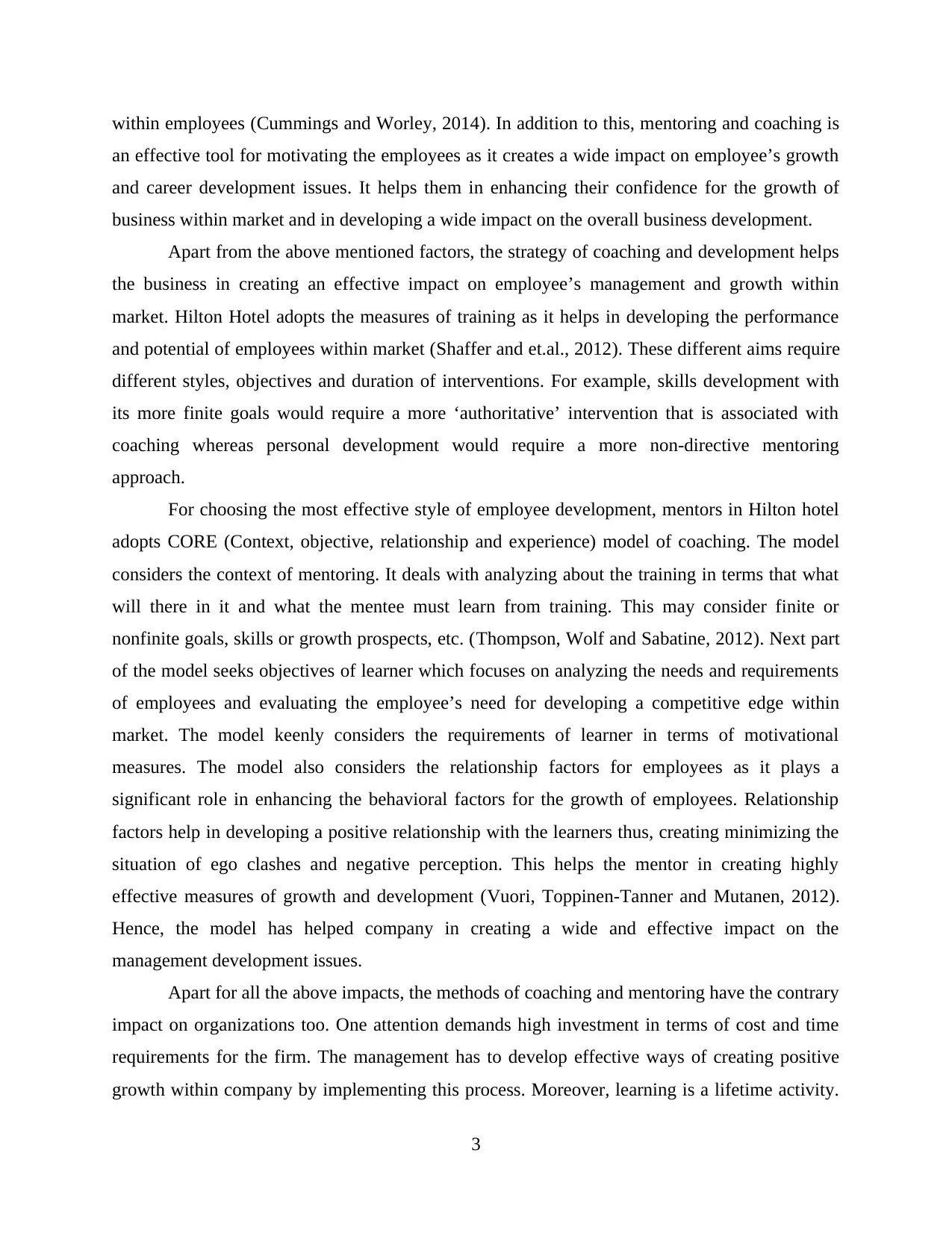
within employees (Cummings and Worley, 2014). In addition to this, mentoring and coaching is
an effective tool for motivating the employees as it creates a wide impact on employee’s growth
and career development issues. It helps them in enhancing their confidence for the growth of
business within market and in developing a wide impact on the overall business development.
Apart from the above mentioned factors, the strategy of coaching and development helps
the business in creating an effective impact on employee’s management and growth within
market. Hilton Hotel adopts the measures of training as it helps in developing the performance
and potential of employees within market (Shaffer and et.al., 2012). These different aims require
different styles, objectives and duration of interventions. For example, skills development with
its more finite goals would require a more ‘authoritative’ intervention that is associated with
coaching whereas personal development would require a more non-directive mentoring
approach.
For choosing the most effective style of employee development, mentors in Hilton hotel
adopts CORE (Context, objective, relationship and experience) model of coaching. The model
considers the context of mentoring. It deals with analyzing about the training in terms that what
will there in it and what the mentee must learn from training. This may consider finite or
nonfinite goals, skills or growth prospects, etc. (Thompson, Wolf and Sabatine, 2012). Next part
of the model seeks objectives of learner which focuses on analyzing the needs and requirements
of employees and evaluating the employee’s need for developing a competitive edge within
market. The model keenly considers the requirements of learner in terms of motivational
measures. The model also considers the relationship factors for employees as it plays a
significant role in enhancing the behavioral factors for the growth of employees. Relationship
factors help in developing a positive relationship with the learners thus, creating minimizing the
situation of ego clashes and negative perception. This helps the mentor in creating highly
effective measures of growth and development (Vuori, Toppinen-Tanner and Mutanen, 2012).
Hence, the model has helped company in creating a wide and effective impact on the
management development issues.
Apart for all the above impacts, the methods of coaching and mentoring have the contrary
impact on organizations too. One attention demands high investment in terms of cost and time
requirements for the firm. The management has to develop effective ways of creating positive
growth within company by implementing this process. Moreover, learning is a lifetime activity.
3
an effective tool for motivating the employees as it creates a wide impact on employee’s growth
and career development issues. It helps them in enhancing their confidence for the growth of
business within market and in developing a wide impact on the overall business development.
Apart from the above mentioned factors, the strategy of coaching and development helps
the business in creating an effective impact on employee’s management and growth within
market. Hilton Hotel adopts the measures of training as it helps in developing the performance
and potential of employees within market (Shaffer and et.al., 2012). These different aims require
different styles, objectives and duration of interventions. For example, skills development with
its more finite goals would require a more ‘authoritative’ intervention that is associated with
coaching whereas personal development would require a more non-directive mentoring
approach.
For choosing the most effective style of employee development, mentors in Hilton hotel
adopts CORE (Context, objective, relationship and experience) model of coaching. The model
considers the context of mentoring. It deals with analyzing about the training in terms that what
will there in it and what the mentee must learn from training. This may consider finite or
nonfinite goals, skills or growth prospects, etc. (Thompson, Wolf and Sabatine, 2012). Next part
of the model seeks objectives of learner which focuses on analyzing the needs and requirements
of employees and evaluating the employee’s need for developing a competitive edge within
market. The model keenly considers the requirements of learner in terms of motivational
measures. The model also considers the relationship factors for employees as it plays a
significant role in enhancing the behavioral factors for the growth of employees. Relationship
factors help in developing a positive relationship with the learners thus, creating minimizing the
situation of ego clashes and negative perception. This helps the mentor in creating highly
effective measures of growth and development (Vuori, Toppinen-Tanner and Mutanen, 2012).
Hence, the model has helped company in creating a wide and effective impact on the
management development issues.
Apart for all the above impacts, the methods of coaching and mentoring have the contrary
impact on organizations too. One attention demands high investment in terms of cost and time
requirements for the firm. The management has to develop effective ways of creating positive
growth within company by implementing this process. Moreover, learning is a lifetime activity.
3
Paraphrase This Document
Need a fresh take? Get an instant paraphrase of this document with our AI Paraphraser
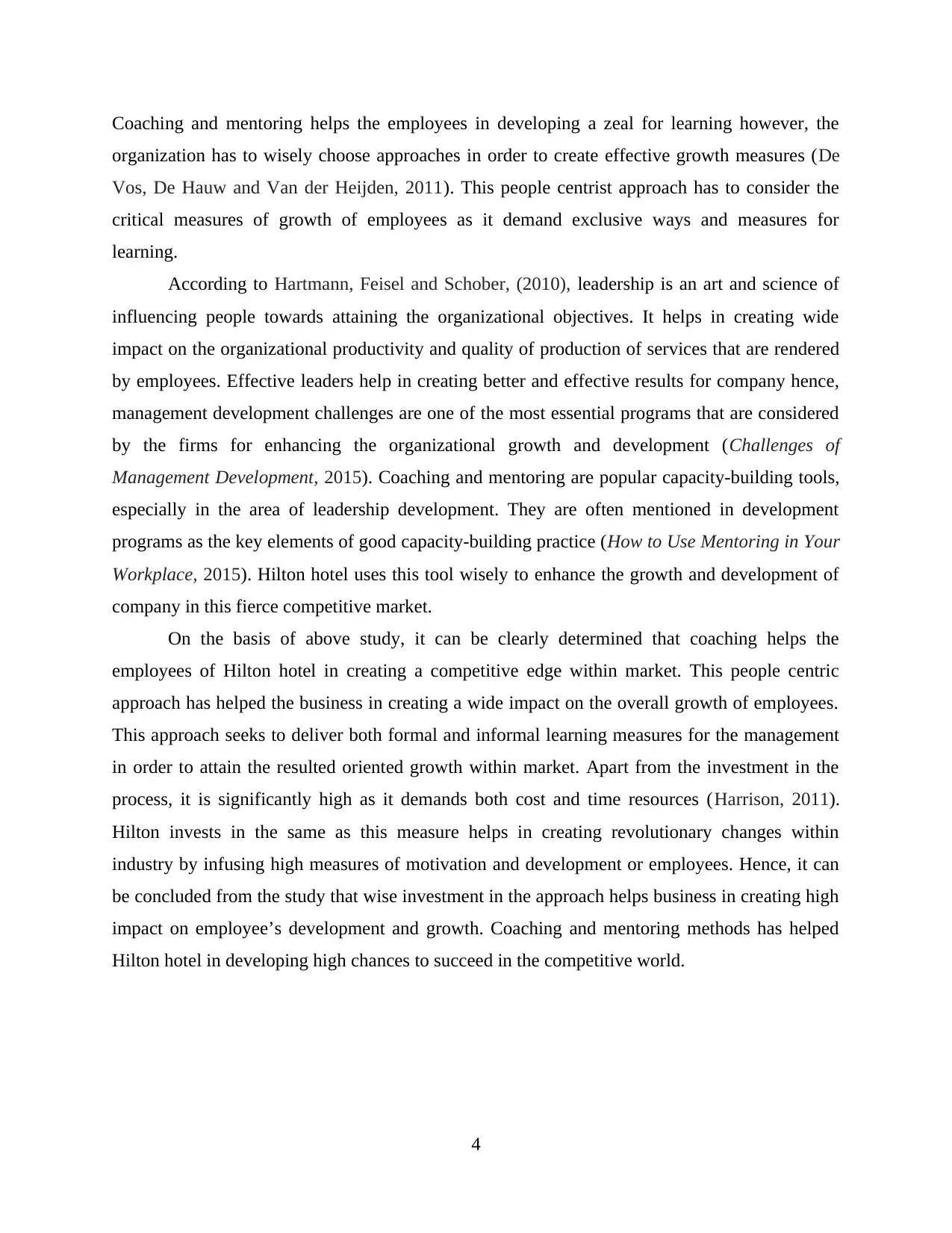
Coaching and mentoring helps the employees in developing a zeal for learning however, the
organization has to wisely choose approaches in order to create effective growth measures (De
Vos, De Hauw and Van der Heijden, 2011). This people centrist approach has to consider the
critical measures of growth of employees as it demand exclusive ways and measures for
learning.
According to Hartmann, Feisel and Schober, (2010), leadership is an art and science of
influencing people towards attaining the organizational objectives. It helps in creating wide
impact on the organizational productivity and quality of production of services that are rendered
by employees. Effective leaders help in creating better and effective results for company hence,
management development challenges are one of the most essential programs that are considered
by the firms for enhancing the organizational growth and development (Challenges of
Management Development, 2015). Coaching and mentoring are popular capacity-building tools,
especially in the area of leadership development. They are often mentioned in development
programs as the key elements of good capacity-building practice (How to Use Mentoring in Your
Workplace, 2015). Hilton hotel uses this tool wisely to enhance the growth and development of
company in this fierce competitive market.
On the basis of above study, it can be clearly determined that coaching helps the
employees of Hilton hotel in creating a competitive edge within market. This people centric
approach has helped the business in creating a wide impact on the overall growth of employees.
This approach seeks to deliver both formal and informal learning measures for the management
in order to attain the resulted oriented growth within market. Apart from the investment in the
process, it is significantly high as it demands both cost and time resources (Harrison, 2011).
Hilton invests in the same as this measure helps in creating revolutionary changes within
industry by infusing high measures of motivation and development or employees. Hence, it can
be concluded from the study that wise investment in the approach helps business in creating high
impact on employee’s development and growth. Coaching and mentoring methods has helped
Hilton hotel in developing high chances to succeed in the competitive world.
4
organization has to wisely choose approaches in order to create effective growth measures (De
Vos, De Hauw and Van der Heijden, 2011). This people centrist approach has to consider the
critical measures of growth of employees as it demand exclusive ways and measures for
learning.
According to Hartmann, Feisel and Schober, (2010), leadership is an art and science of
influencing people towards attaining the organizational objectives. It helps in creating wide
impact on the organizational productivity and quality of production of services that are rendered
by employees. Effective leaders help in creating better and effective results for company hence,
management development challenges are one of the most essential programs that are considered
by the firms for enhancing the organizational growth and development (Challenges of
Management Development, 2015). Coaching and mentoring are popular capacity-building tools,
especially in the area of leadership development. They are often mentioned in development
programs as the key elements of good capacity-building practice (How to Use Mentoring in Your
Workplace, 2015). Hilton hotel uses this tool wisely to enhance the growth and development of
company in this fierce competitive market.
On the basis of above study, it can be clearly determined that coaching helps the
employees of Hilton hotel in creating a competitive edge within market. This people centric
approach has helped the business in creating a wide impact on the overall growth of employees.
This approach seeks to deliver both formal and informal learning measures for the management
in order to attain the resulted oriented growth within market. Apart from the investment in the
process, it is significantly high as it demands both cost and time resources (Harrison, 2011).
Hilton invests in the same as this measure helps in creating revolutionary changes within
industry by infusing high measures of motivation and development or employees. Hence, it can
be concluded from the study that wise investment in the approach helps business in creating high
impact on employee’s development and growth. Coaching and mentoring methods has helped
Hilton hotel in developing high chances to succeed in the competitive world.
4
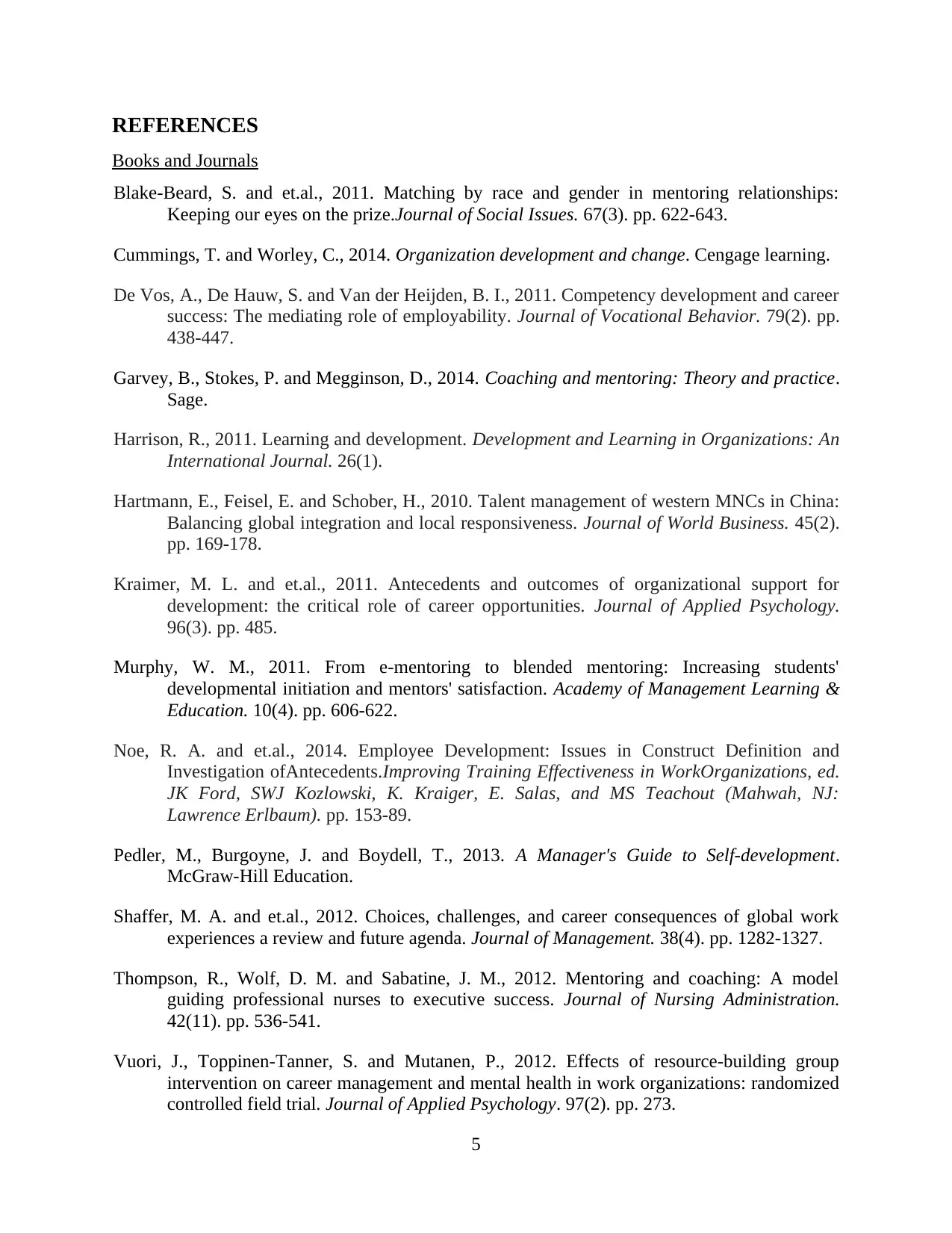
REFERENCES
Books and Journals
Blake‐Beard, S. and et.al., 2011. Matching by race and gender in mentoring relationships:
Keeping our eyes on the prize.Journal of Social Issues. 67(3). pp. 622-643.
Cummings, T. and Worley, C., 2014. Organization development and change. Cengage learning.
De Vos, A., De Hauw, S. and Van der Heijden, B. I., 2011. Competency development and career
success: The mediating role of employability. Journal of Vocational Behavior. 79(2). pp.
438-447.
Garvey, B., Stokes, P. and Megginson, D., 2014. Coaching and mentoring: Theory and practice.
Sage.
Harrison, R., 2011. Learning and development. Development and Learning in Organizations: An
International Journal. 26(1).
Hartmann, E., Feisel, E. and Schober, H., 2010. Talent management of western MNCs in China:
Balancing global integration and local responsiveness. Journal of World Business. 45(2).
pp. 169-178.
Kraimer, M. L. and et.al., 2011. Antecedents and outcomes of organizational support for
development: the critical role of career opportunities. Journal of Applied Psychology.
96(3). pp. 485.
Murphy, W. M., 2011. From e-mentoring to blended mentoring: Increasing students'
developmental initiation and mentors' satisfaction. Academy of Management Learning &
Education. 10(4). pp. 606-622.
Noe, R. A. and et.al., 2014. Employee Development: Issues in Construct Definition and
Investigation ofAntecedents.Improving Training Effectiveness in WorkOrganizations, ed.
JK Ford, SWJ Kozlowski, K. Kraiger, E. Salas, and MS Teachout (Mahwah, NJ:
Lawrence Erlbaum). pp. 153-89.
Pedler, M., Burgoyne, J. and Boydell, T., 2013. A Manager's Guide to Self-development.
McGraw-Hill Education.
Shaffer, M. A. and et.al., 2012. Choices, challenges, and career consequences of global work
experiences a review and future agenda. Journal of Management. 38(4). pp. 1282-1327.
Thompson, R., Wolf, D. M. and Sabatine, J. M., 2012. Mentoring and coaching: A model
guiding professional nurses to executive success. Journal of Nursing Administration.
42(11). pp. 536-541.
Vuori, J., Toppinen-Tanner, S. and Mutanen, P., 2012. Effects of resource-building group
intervention on career management and mental health in work organizations: randomized
controlled field trial. Journal of Applied Psychology. 97(2). pp. 273.
5
Books and Journals
Blake‐Beard, S. and et.al., 2011. Matching by race and gender in mentoring relationships:
Keeping our eyes on the prize.Journal of Social Issues. 67(3). pp. 622-643.
Cummings, T. and Worley, C., 2014. Organization development and change. Cengage learning.
De Vos, A., De Hauw, S. and Van der Heijden, B. I., 2011. Competency development and career
success: The mediating role of employability. Journal of Vocational Behavior. 79(2). pp.
438-447.
Garvey, B., Stokes, P. and Megginson, D., 2014. Coaching and mentoring: Theory and practice.
Sage.
Harrison, R., 2011. Learning and development. Development and Learning in Organizations: An
International Journal. 26(1).
Hartmann, E., Feisel, E. and Schober, H., 2010. Talent management of western MNCs in China:
Balancing global integration and local responsiveness. Journal of World Business. 45(2).
pp. 169-178.
Kraimer, M. L. and et.al., 2011. Antecedents and outcomes of organizational support for
development: the critical role of career opportunities. Journal of Applied Psychology.
96(3). pp. 485.
Murphy, W. M., 2011. From e-mentoring to blended mentoring: Increasing students'
developmental initiation and mentors' satisfaction. Academy of Management Learning &
Education. 10(4). pp. 606-622.
Noe, R. A. and et.al., 2014. Employee Development: Issues in Construct Definition and
Investigation ofAntecedents.Improving Training Effectiveness in WorkOrganizations, ed.
JK Ford, SWJ Kozlowski, K. Kraiger, E. Salas, and MS Teachout (Mahwah, NJ:
Lawrence Erlbaum). pp. 153-89.
Pedler, M., Burgoyne, J. and Boydell, T., 2013. A Manager's Guide to Self-development.
McGraw-Hill Education.
Shaffer, M. A. and et.al., 2012. Choices, challenges, and career consequences of global work
experiences a review and future agenda. Journal of Management. 38(4). pp. 1282-1327.
Thompson, R., Wolf, D. M. and Sabatine, J. M., 2012. Mentoring and coaching: A model
guiding professional nurses to executive success. Journal of Nursing Administration.
42(11). pp. 536-541.
Vuori, J., Toppinen-Tanner, S. and Mutanen, P., 2012. Effects of resource-building group
intervention on career management and mental health in work organizations: randomized
controlled field trial. Journal of Applied Psychology. 97(2). pp. 273.
5
⊘ This is a preview!⊘
Do you want full access?
Subscribe today to unlock all pages.

Trusted by 1+ million students worldwide
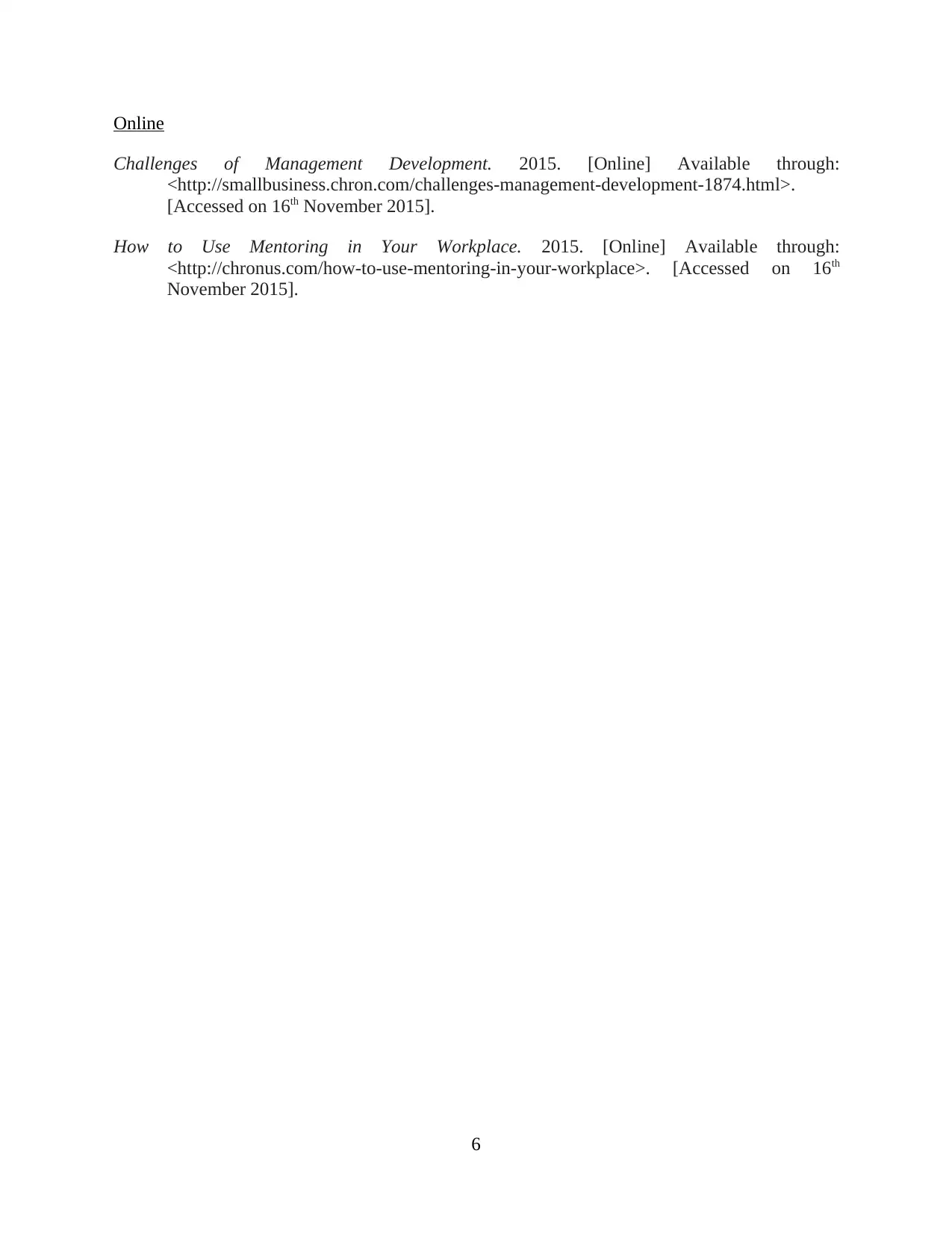
Online
Challenges of Management Development. 2015. [Online] Available through:
<http://smallbusiness.chron.com/challenges-management-development-1874.html>.
[Accessed on 16th November 2015].
How to Use Mentoring in Your Workplace. 2015. [Online] Available through:
<http://chronus.com/how-to-use-mentoring-in-your-workplace>. [Accessed on 16th
November 2015].
6
Challenges of Management Development. 2015. [Online] Available through:
<http://smallbusiness.chron.com/challenges-management-development-1874.html>.
[Accessed on 16th November 2015].
How to Use Mentoring in Your Workplace. 2015. [Online] Available through:
<http://chronus.com/how-to-use-mentoring-in-your-workplace>. [Accessed on 16th
November 2015].
6
1 out of 7
Related Documents
Your All-in-One AI-Powered Toolkit for Academic Success.
+13062052269
info@desklib.com
Available 24*7 on WhatsApp / Email
![[object Object]](/_next/static/media/star-bottom.7253800d.svg)
Unlock your academic potential
Copyright © 2020–2026 A2Z Services. All Rights Reserved. Developed and managed by ZUCOL.





